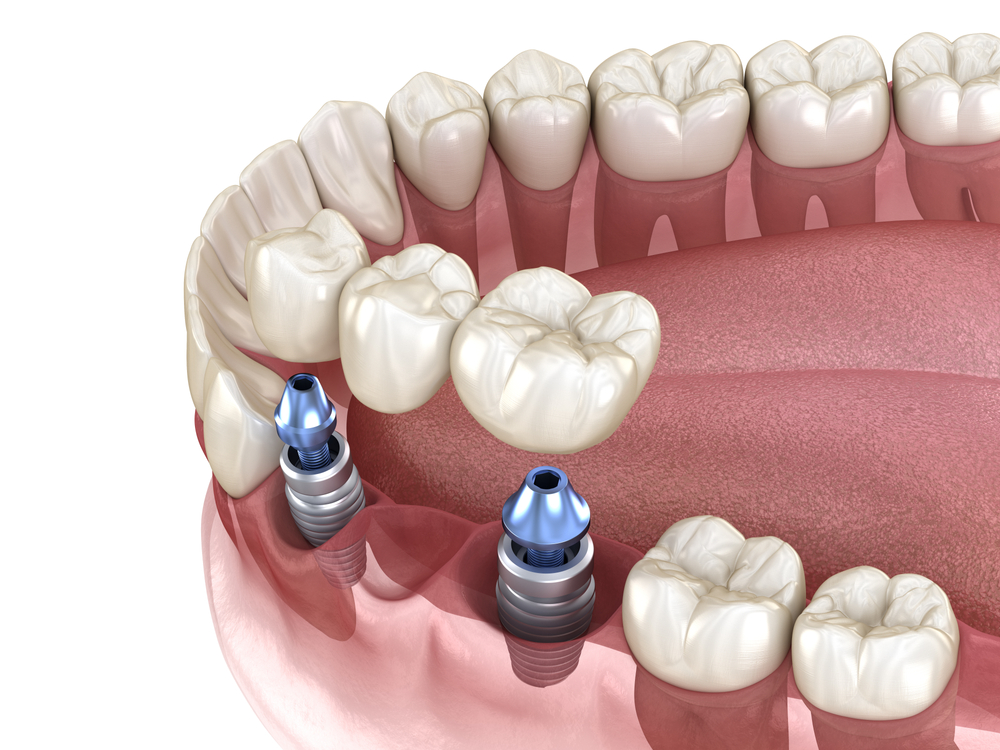Understanding Tooth Replacement Options
Dealing with tooth loss can be challenging, but the right replacement option can transform your life. Common choices include dentures and dental implants, both of which are designed to mimic the appearance of natural teeth. Missing teeth can hinder eating and speaking, but selecting the right solution benefits your oral health by maintaining jawbone strength and enhancing your appearance. Everyone has unique needs, so it’s essential to understand the pros and cons of each option.
What Are Dental Implants?
Dental implants are among the most effective and durable solutions for missing teeth. A dentist inserts a small titanium post into your jawbone, serving as a tooth root that bonds with the bone. This provides a stable base for a new crown, mimicking the appearance and strength of natural teeth.
The implant process involves several steps: consultation, placement of the implant in the jawbone, and, later, attachment of the final crown. Over time, the implant integrates with the jawbone, thereby enhancing oral health by preventing bone loss and maintaining the alignment of adjacent teeth.
Key benefits of implants include their natural appearance, superior comfort compared to dentures, and long-lasting durability when maintained with good oral hygiene. Now, let’s compare them to dentures to highlight their differences.
What Are Dentures?
Dentures effectively replace missing teeth. You can opt for complete dentures if all teeth in your upper or lower jaw are gone or removable partial dentures if only a few are missing. These artificial teeth rest on your gums and bone for support, sometimes attaching to remaining natural teeth.
There are several denture types:
- Full dentures replace all teeth.
- Partial dentures replace some missing teeth.
- Immediate dentures are placed right after extractions.
- Implant-retained dentures are connected to dental implants for enhanced stability.
Made from acrylic, resin, or metal, dentists create custom-fit dentures using impressions and models to ensure they look and feel natural.
Key Differences Between Dental Implants and Dentures
Choosing between dental implants and dentures requires understanding their key differences. Dental implants mimic natural teeth, remain stable over time, and prevent bone loss. Dentures are removable and rest on the soft tissues of your mouth.
Cost is another factor: while dentures are generally cheaper upfront, implants offer long-term value due to their durability and longevity. In terms of comfort and appearance, implants provide stability, whereas dentures can shift during eating or speaking.
Next, let’s examine the materials used for both options and their aesthetic appeal.
Materials and Aesthetics
The materials used in dental implants vs. dentures contribute significantly to their aesthetic and durability. Dental implants incorporate titanium for the post and lifelike crowns for the replacement tooth, delivering a seamless smile that mirrors natural teeth. Their high-end restorations often blend effortlessly, preserving facial structure.
On the other hand, dentures are typically made from acrylic, resin, or nylon and are supported by a gum-colored base. While traditional dentures deliver satisfactory aesthetics, advanced options, such as implant-supported dentures, offer improved alignment and a more natural appearance.
| Feature | Dental Implants | Dentures |
|---|---|---|
| Material | Titanium, ceramic crowns | Acrylic, resin, nylon |
| Appearance | Highly realistic | Moderately realistic |
| Longevity | Long-term with proper care | Replace after 7-10 years |
Now, let’s discuss the comfort and functionality of both options.
Comfort and Functionality
Your choice between dental implants and dentures depends on comfort and daily functionality. Dental implants offer a natural chewing and speaking experience, as they are fixed in the jawbone, preventing movement or slippage. With proper oral hygiene, they remain effective. In contrast, traditional dentures may feel less stable without proper care or adhesive and can shift while eating or talking. However, newer implant-supported dentures snap onto implants for better stability.
Daily maintenance is essential for both options. With good oral hygiene and care, you can maximize their lifespan.
Pros and Cons of Dental Implants
Dental implants offer significant benefits for tooth loss. They provide a durable, natural-looking solution that enhances oral health. While strong and long-lasting, they require initial surgery and investment. Some individuals may experience complications, such as pain or discomfort, and healing can take time. However, many find the long-term results worthwhile. Now, let’s examine the primary benefits of dental implants.
Advantages of Dental Implants
Choosing dental implants offers several benefits:
- Enhanced jawbone health: Implants preserve jaw strength, preventing bone loss.
- Support for adjacent teeth: They keep nearby teeth stable and improve quality of life.
- Long-lasting solution: With good oral hygiene, implants can outlast most other replacements.
- Natural appearance and feel: They resemble your own teeth and blend well with your face.
Additionally, implants don’t rely on other teeth for support, simplifying maintenance. However, it’s essential to consider potential drawbacks as well.
Potential Drawbacks of Dental Implants
While dental implants are strong and durable, consider these potential challenges:
- Higher Upfront Cost: Prices range from $5,705 to $12,956, so budget accordingly.
- Surgical Discomfort: The procedure may cause mild discomfort and requires a recovery period.
- Risk of Complications: Rare issues, such as infection or implant failure, can occur if proper care is not provided.
- Long Process: Bone healing can take months, requiring patience.
Despite these factors, many find the long-term benefits outweigh the drawbacks. Now, let’s examine dentures more closely.
Pros and Cons of Dentures
Dentures effectively replace missing teeth, offering a less invasive option to restore both appearance and functionality at a reasonable cost. Various types exist, but some soft tissue-supported dentures may lack stability during use. Users should be aware that regular adjustments are necessary due to the gradual loss of jawbone density, which can affect the fit. Evaluating the benefits can help determine if dentures are suitable for you.
Advantages of Dentures
Choosing dentures offers practical benefits for those in need:
- Affordability: Dentures are typically more affordable than implants.
- Versatility: Options include removable partials or complete dentures, suitable for various mouth types.
- Quick results: Immediate dentures can be ready shortly after tooth extractions.
- Support: Dentures can fill gaps from a single tooth to a full arch.
Dentists can also make adjustments over time to ensure comfort.
Potential Drawbacks of Dentures
While dentures can be beneficial, they come with challenges:
- Adjustment Discomfort: Initially, your mouth needs time to adapt. Proper care for both your gums and the dentures is essential.
- Maintenance: Regular cleaning is necessary, involving the use of wax or cleaning solutions, which can become a daily routine.
- Stability Issues: Without adhesives, dentures may shift while eating or speaking.
- Jawbone Changes: Over time, bone loss can affect the fit and longevity of dentures.
Due to these issues, many consider implant-supported dentures as a better alternative. When deciding between dental implants and dentures, consider your specific needs and consult with your dental provider to determine the best option for your situation.
Schedule a Consultation
The specialists at Palm Beach Periodontics can help you decide whether dental implants or dentures are right for your mouth and your wallet. Schedule a consultation to get started.












